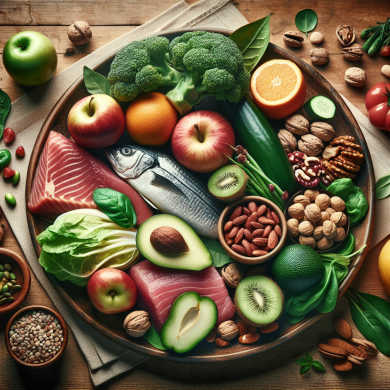Paleo Diet: Boosting Gut Health Naturally
Introduction to the Paleo Diet
The Paleo Diet, often referred to as the “caveman diet,” has gained significant popularity over the past few decades. This dietary approach mimics the eating habits of our Paleolithic ancestors, focusing on whole, unprocessed foods. The underlying principle is that our bodies are genetically adapted to these types of foods, which can lead to improved health outcomes. One area where the Paleo diet may offer considerable benefits is gut health.
The Importance of Gut Health
Gut health has become a hot topic in recent years, as research continues to uncover its crucial role in overall well-being. The gut, often referred to as the “second brain,” houses trillions of bacteria that not only aid in digestion but also influence immune function, mental health, and disease prevention. Maintaining a healthy gut microbiome is essential for optimal health.
The Role of Gut Microbiota
Our gut is home to a complex community of microorganisms, including bacteria, viruses, and fungi, collectively known as the microbiota. These microorganisms perform vital functions such as breaking down food, synthesizing vitamins, and protecting against harmful pathogens. A balanced gut microbiome is key to maintaining effective digestive processes and supporting the immune system.
How the Paleo Diet Supports Gut Health
One of the main benefits of the Paleo diet is its focus on whole, unprocessed foods, which can have a profound impact on gut health. By eliminating processed foods, refined sugars, and grains, the Paleo diet helps to reduce inflammation and promote a healthy gut environment.
Elimination of Processed Foods and Refined Sugars
Processed foods and refined sugars can disrupt the balance of gut bacteria, leading to the proliferation of harmful microbes. These foods are often high in additives and preservatives, which can irritate the gut lining and contribute to inflammation. The Paleo diet’s exclusion of these foods helps reduce the intake of harmful substances, supporting a healthier gut microbiome.
Increased Fiber Intake
The Paleo diet emphasizes the consumption of fruits, vegetables, nuts, and seeds, all of which are rich in dietary fiber. Fiber is essential for gut health as it serves as a prebiotic, feeding beneficial bacteria and promoting their growth. A diet high in fiber can increase the production of short-chain fatty acids (SCFAs), which are important for maintaining the integrity of the gut lining and reducing inflammation.
Inclusion of Fermented Foods
While not traditionally a part of the Paleolithic era, fermented foods can be included in a modern Paleo diet to boost gut health. Fermented foods like sauerkraut, kimchi, and kombucha are rich in probiotics, which are beneficial bacteria that support a healthy gut microbiome. Including these foods can enhance the diversity and balance of gut bacteria, improving digestive health.
Reduction of Inflammatory Foods
The Paleo diet excludes foods that are known to trigger inflammation, such as grains and dairy. These foods can cause digestive discomfort and contribute to the development of conditions like leaky gut syndrome. By removing these inflammatory foods, the Paleo diet helps to soothe the gut and reduce the risk of chronic inflammation.
Scientific Evidence Supporting the Paleo Diet for Gut Health
Several studies have explored the effects of the Paleo diet on gut health, with promising results. Research suggests that individuals following a Paleo diet may experience improvements in gut microbiota composition and function.
Study on Gut Microbiota Diversity
A study published in the “European Journal of Clinical Nutrition” found that participants who followed a Paleo diet had a more diverse gut microbiota compared to those on a typical Western diet. Increased microbial diversity is associated with better gut health, as it enhances the gut’s resilience against harmful pathogens and supports effective digestion.
Impact on Inflammatory Markers
Another study published in the “Journal of Nutrition and Metabolism” examined the impact of the Paleo diet on inflammatory markers in individuals with metabolic syndrome. The results indicated that the Paleo diet led to a significant reduction in markers of inflammation, suggesting a positive effect on gut health and overall inflammation levels.
Practical Tips for Implementing a Paleo Diet for Gut Health
Transitioning to a Paleo diet can be a beneficial step towards improving gut health. Here are some practical tips to help you get started:
Start with Whole Foods
Focus on incorporating whole, unprocessed foods into your diet. Fresh fruits and vegetables, lean meats, fish, eggs, nuts, and seeds should form the foundation of your meals. Avoid packaged and processed foods that contain artificial additives and preservatives.
Embrace Variety
Diversity is key when it comes to gut health. Aim to include a wide variety of fruits, vegetables, and proteins in your diet to ensure you’re getting a broad spectrum of nutrients. Different foods provide different types of fiber and micronutrients that support a healthy gut microbiome.
Incorporate Fermented Foods
Add fermented foods to your diet to boost your intake of probiotics. Try including sauerkraut, kimchi, yogurt, kefir, and kombucha in your meals. These foods can help support a balanced and diverse gut microbiome.
Stay Hydrated
Proper hydration is essential for maintaining a healthy digestive system. Drinking enough water helps regulate bowel movements and supports the function of gut bacteria. Aim to drink plenty of water throughout the day, especially if you are increasing your fiber intake.
Potential Challenges and Considerations
While the Paleo diet offers numerous benefits for gut health, it’s important to consider potential challenges and individual differences.
Personalization and Flexibility
Every individual’s gut microbiome is unique, and what works for one person may not work for another. It’s essential to listen to your body and make adjustments as needed. Some individuals may tolerate small amounts of certain excluded foods, such as legumes or dairy, without adverse effects.
Potential Nutrient Deficiencies
The exclusion of certain food groups in the Paleo diet, such as grains and dairy, can lead to potential nutrient deficiencies if not properly managed. Ensure you’re getting enough calcium, vitamin D, and other essential nutrients by including a variety of foods and considering supplementation if necessary.
Conclusion
The Paleo diet offers a natural and holistic approach to improving gut health. By focusing on whole, unprocessed foods and eliminating inflammatory substances, this dietary approach can support a diverse and balanced gut microbiome. As with any dietary change, it’s important to consider individual needs and make adjustments accordingly. By embracing the principles of the Paleo diet, you can take a proactive step towards boosting your gut health naturally and supporting your overall well-being.















Add comment